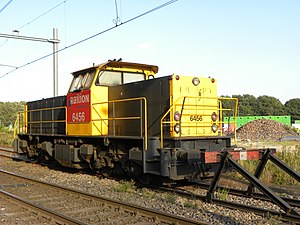Eurotunnel Class 0001
| Eurotunnel Class 0001 | |||||||||||||||||||
|---|---|---|---|---|---|---|---|---|---|---|---|---|---|---|---|---|---|---|---|
 Railion unit. | |||||||||||||||||||
| |||||||||||||||||||
| |||||||||||||||||||
| |||||||||||||||||||
| |||||||||||||||||||
| Sources:[2] except where noted Details refer to original 5 locomotives acquired, for more information on the five units added in 2010 & 2016 see NS Class 6400 | |||||||||||||||||||
The Eurotunnel Class 0001 Bo-Bo diesel-electric locomotives were built by Maschinenbau Kiel (manufacturers designation DE 1004) between 1991 and 1992.[2] They are very similar to the NS 6400 Class. When operating in the United Kingdom, the locomotives are assigned a TOPS classification as Class 21.[6]
History and design
Five locomotives were built, numbered 0001–0005. They carry a yellow and grey livery and are used by Getlink for rescuing trains in the Channel Tunnel, and for propelling service trains in the channel tunnel. They are cleared to travel to Calais, Ashford, or St. Pancras; since 2007 they have been authorised to rescue trains on High Speed 1 in the event of a power failure.[7] They have also been used to haul the SNCF TGV Iris 320 test train through the Channel Tunnel.[8]
In 2007 the locomotives were fitted with diesel particulate filters for the exhaust gases,[9] which replaced the exhaust scrubber wagons that were previously coupled to the engines.[10]
Following a series of tunnel breakdowns due to snow during winter 2009/10, during which the locomotives were extensively used,[11] in November 2010 Eurotunnel announced it was to acquire two more "Krupp rescue locomotives"[note 1] with co-financing from Eurostar, at a cost of €1.3 million.[3][note 2] The locomotives acquired were similar NS 6400 locomotives bought second hand from DB Schenker Nederland,[12] which were renumbered as 0006-0007.[4] Eurotunnel acquired a further three in September 2016. One of these three will be retained as a shunter to work at the goods yard at Calais-Fréthun, and has received the silver and blue Europorte livery, while the other two have the grey and yellow Eurotunnel livery identical to the remainder of the fleet.[5]
| Class | Operator | No. Built (Year) | Number Range | Notes | |
|---|---|---|---|---|---|
| 0001 | Eurotunnel | 1991–1992 | 0001–0005 | ||
| 0006–0010 | Purchased from DB Schenker Nederland | ||||
| List of locomotives | |||||
| Current Number | Previous Number | Current Livery | Status | Notes | |
| Eurotunnel | TOPS | ||||
| 0001 | 21901 | Eurotunnel Yellow/Grey | Operational | ||
| 0002 | 21902 | Eurotunnel Yellow/Grey | Operational | ||
| 0003 | 21903 | Eurotunnel Yellow/Grey | Operational | ||
| 0004 | 21904 | Eurotunnel Yellow/Grey | Operational | ||
| 0005 | 21905 | Eurotunnel Yellow/Grey | Operational | ||
| 0006 | 21906 | NS6456 | Eurotunnel Yellow/Grey | Operational | |
| 0007 | 21907 | NS6457 | Eurotunnel Yellow/Grey | Operational | |
| 0008 | 21908 | NS6450 | Eurotunnel Yellow/Grey | Operational | |
| 0009 | 21909 | NS6451 | Eurotunnel Yellow/Grey | Operational | |
| 0010 | 21910 | NS6447 | Europorte Silver/Blue | Operational | Shunter at Calais-Frethun |
Notes
- ^ The MaK plant where the locomotives were built was part of the Krupp group in the 1990s
- ^ See 16–19 December European snowfall
References
- ^ a b c d "loks-aus-kiel.de - MaK - DE 1004". www.loks-aus-kiel.de.
- ^ a b c "MaK - DE 1004", www.loks-aus-kiel.de (in German)
- ^ a b Sources:
- Kreab Gavin Anderson (3 November 2010), "Eurotunnel and Eurostar co-finance purchase of two rescue units", www.europeanrailwayreview.com
- "Two more Krupps for Channel Tunnel". Modern Railways.
- ^ a b c Sources:
- "Fahrzeugportrait MaK 1200056", www.loks-aus-kiel.de (in German)
- "Fahrzeugportrait MaK 1200057", www.loks-aus-kiel.de (in German)
- ^ a b "ECR transfers former DB DE6400s to Calais". mainline diesels.net. Retrieved 8 February 2017.
- ^ "Eurotunnel locos on TOPS". EBSCO. Railways Illustrated. April 2010. Retrieved 8 February 2017.
- ^ Jeff Baker (28 April 2009), "Exhaust Emission Control" (PDF), www.uic.org, Eurotunnel, The Krupp Locomotive, p.3[permanent dead link]
- ^ "Maintenance" (PDF). Inspecting the infrastructure at 100 km/h. Annual Report (Report). Eurotunnel Group. 2010. p. 24. Retrieved 7 June 2011.
IRIS 320 measuring train … since December 2010, … inspecting the Channel Tunnel, pulled by a Eurotunnel diesel locomotive at 100 km/h … every two months
- ^ "MaK - DE 1004", www.loks-aus-kiel.de (in German), see individual locomotive history sections
- ^ A breath of fresh air for Eurotunnel maintenance crews Roberto Chellini, Diesel & Gas Turbine worldwide, July–August 2007, www.hug-eng.ch
- ^ "Eurostar Independent Review" (PDF), www.railwaysarchive,co.uk, 12 February 2010
- ^ "Eurotunnel buys more rescue locomotives". www.railwaygazette.com. Railway Gazette International. 3 November 2010.
External links
- Images
- Kevin Cooper, "Working of the year? - Euro Tunnel Krupps & SNCF TGV 951 at Rainham 21/03/12", www.flickr.com
- "Eurotunnel 0004 20120321 St Pancras", www.flickr.com
- "0001", www.flickr.com, maintenance at the former NedTrain workshops in Tilburg
